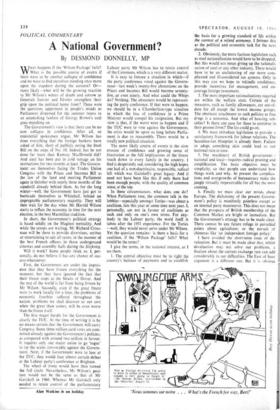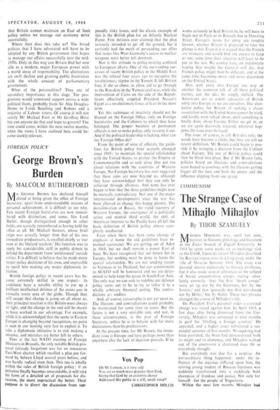A National Government?
POLITICAL COMMENTARY By DESMOND DONNELLY, MP WHAT happens if the Wilson Package' fails? What is the possible course of events if there were to be another collapse of confidence and we were to find ourselves standing once more upon the trapdoor during the autumn? Or— more likely—what will be the growing reaction to Mr Wilson's winter of doubt and sorrow as Generals Janvier and Fevrier strengthen their grip upon the political home front? These were the questions uppermost in people's minds as Parliament dispersed for the summer recess to an astonishing fanfare of George Brown's soul goes marching on.
The Government's view is that there can be no new collapse in confidence. After all, so ministerial spokesmen argue, Mr Wilson has done everything that the foreign bankers have asked of him, short of publicly eating the Steel Bill on the steps a No. 10. Indeed, has he not done far more than Ramsay MacDonald did? And steel has been put in cold storage on his instructions for two months at least. The Govern- ment see themselves facing the Trades Union Congress with the Prices and Incomes Bill as the law of the land and meeting Parliament again in October with nearly three months of the standstill already behind them. As for the long winter—well, the Government have just got to barricade themselves in Whitehall, behind an impregnable parliamentary majority. They will then wait for the day when Mr Harold Wilson starts to rebate the economy in time for the next election, in the best Macmillan tradition.
In short, the Government's political strategy is based solidly on the Maginot mentality. And while the troops are waiting, Mr Richard Cross- man will be there to provide diversions, serious or entertaining to suit all tastes, in the manner of the best French officers in those underground cinemas and assembly halls during the Sitzkrieg.
Will it work? Some people think so. I, per- sonally, do not believe it has any chance of suc- cess whatsoever.
First, the Government are under the impres- sion that they have frozen everything for the moment, but they have ignored the fact that their freeze stops at the Straits of Dover. And the rest of the world is far from being frozen by Mr Wilson. Secondly, even if the great freeze were to work locally for a time, the problems of economic frostbite suffered throughout the nation, problems we shall discover to our cost when the great thaw comes, will be even worse than the freeze itself.
The first major hurdle for the Government is clearly the TUC. At the time of writing it is by no means certain that the Government will carry Congress. Some three million card votes are com- mitted already against the Government's policies; as compared with around two million in favour. It requires only one major union to go 'rogue' to tip the scales irrevocably against the Govern- ment. Next, if the Government were to lose at the TUC, they would face almost certain defeat at the Labour party's conference at Brighton.
The wheel of irony would have then turned the full circle. Nevertheless, Mr Wilson's posi- tion would not be the same as that of Mr Gaitskell in 1960. Whereas Mr Gaitskell only needed to retain control of the parliamentary Labour party Mr Wilson has to retain control of the Commons, which is a very different matter.
It is easy to foresee a situation in which—if the party conference voted against the Govern- ment—last week's twenty-five abstentions on the Prices and Incomes Bill would become seventy- five, or even ninety. And what could the Whips do? Nothing. The abstainers would be represent- ing the party conference. If that were to happen, we should be in a Chamberlain-type situation in which the loss of confidence in a Prime Minister would compel his resignation. But my view is that, if the worst were to happen and if the TUC were to vote against the Government, the crisis would be upon us long before Parlia- ment is due to reassemble. There would be a totally new political situation.
The more likely course of events is the slow erosion of confidence and growing sense of frustration as the full implications of the freeze reach down to every family in the country. I find it desperately sad, considering the high hopes one had of a non-doctrinaire, responsible, radical left which was Gaitskell's great legacy. And it need not have been like this if only there had been enough people, with the quality of common sense, at the top.
In these circumstances, what does one do? When Parliament rose, the common talk in the lobbies—especially amongst Tories—was about a coalition, late this year or some time next year. I, personally, am not in favour of coalitions as such and only on one's own terms. For any- body in the Labour party, the word itself is taboo after the 1931 experience. For the Tories —well, they would never serve under Mr Wilson. Yet the question remains : is there a basis for a coalition, if the `Wilson Package' fails? What would be the terms?
I give the terms, in the national interest, as I see them.
1. The central objective must be to right the country's balance of payments and to establish the basis for a growing standard of life within the context of a mixed economy. I foresee this as the political and economic task for the next decade.
2. Obviously, the more factious legislation such as steel nationalisation would have to be dropped. But this would not mean giving up the rationali- sation of steel or any other industry. There would have to be an uncluttering of our more com- plicated and ill-considered tax systems. Only in this way can we hope to 'rekindle confidence, provide incentives for management, and en- courage foreign investment.
3. The most important rationalisations required are within the welfare state. Certain of the measures, such as family allowances, are out-of- date for all except the lowest income groups. The obstinate attachment to such policies as free drugs is a nonsense. And what of housing sub- sidies? Is there any case for these to continue in their present form? The list could go on.
4. We must introduce legislation to provide a satisfactory framework for labour relations. The Scandinavian blueprint is already there. Failure to adopt something akin could lead to our national ruin in time.
5. The machinery of British government— national and local—requires radical pruning and simplification. The basic objective must be simplicity, so that people can understand how things work and why. At present the complica- tions and overgrowths of bureaucracy make the jungle virtually impenetrable for all but the most cunning.
6. Finally we must clear our minds about Europe. The dichotomy of the present Govern- ment's policy is manifestly pointless except as an internal party manoeuvre. This does not mean that the prospects of British membership of the Common Market are bright or immediate. But the Government's strategy has to be made clear. There cannot be any future refuge in parochial points about agriculture; or the pursuit of chimeras like 'an independent foreign policy.'
I have avoided the short-term issue of de- valuation. But it must be made clear that, whilst devaluation may not solve our problems, a fixation about the current exchange rate can add considerably to our difficulties. The East of Suez argument is a different one. But it is obvious
that Britain cannot maintain an East of Suez policy unless we manage our economy more successfully.
Where then does this take us? The broad policies that I have advocated will have to be adopted by any British government that hopes to manage our affairs successfully into the mid- 1970s. Only in this way can Britain find her new role as a modern, major European power with a world sense of responsibility. The alternatives are swift decline and growing public frustration with the whole concept of parliamentary government.
What of the personalities? They are of secondary importance at this stage. The pro- gramme would command support across a wide political front, probably from Sir Alec Douglas- Home to Lords Beeching and Robens and a majority of Labour voters. Of course it will not satisfy Mr Michael Foot or Mr Geoffrey Hirst but can anyone do that and hope to govern? The time could come, within the next twelve months, when the views I have outlined here could be- come starkly relevant.































 Previous page
Previous page